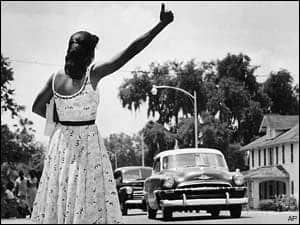Shakespeare didn’t have Romeo and Juliet commit suicide in the first act, and then let the remaining characters pitch tents on the stage and chat aimlessly for the remaining four acts. That was because Shakespeare was a dramatist. His aim was to move people to emotion, to make them think, to shock, horrify, or delight them. Let us, for the sake of argument, assume that he was pretty good at it. Today’s protesters could learn a thing or two from him.Read the whole thing.
As I mentioned in Part 1, the Occupy protest movement began by taking advantage of new methods (the social media), and then quickly reverted to an old formula. The advantage that social media offered was the ability to bring people together quickly to do some strategic and dramatic thing —- to surprise. The “flash mob” is the appropriate template for a protest using social media. The flash mob originated as an amusement —- one in Toronto called people to a pillow fight in front of the Eaton Centre. There have been some political protests using this technique, and these have been dubbed “smart mobs,” but their use has been very limited, so far. The key to the flash mob’s effectiveness is its ability to end as dramatically as it begins. This leaves those in authority disconcerted, and makes them look incompetent. It has the same advantage in protest that guerilla tactics can have in military conflicts.
The Occupy movement has squandered the opportunity to move into the modern age of protest. Social media were used to bring people together, but once there, power reverted to the traditionalists, and the only thing they could think of doing was squatting down and staying put. The smart mob turned into a “sit in,” a protest relic from a generation ago that is notorious for its ineffectiveness and tendency to alienate the very people that the protest is supposed to convince.
...
If you speak to these old-schoolers, it won’t be long before you hear them prattle nonsense about how they are continuing the traditions of the Civil Rights Movement in the 1950’s and 1960’s. They are deluding themselves. The Civil Rights activists were not amusing themselves. They did not go out on picnics. They were dealing with the Ku Klux Klan, and with corrupt and violent state governments in the American south. They were in constant danger. Civil Rights activists faced the serious possibility of being tortured or killed. Everything done was aimed at projecting an atmosphere of seriousness of purpose, and of clearly delineating the moral issues involved. Anyone who wants to see real protest in action could do no better than to study the events of the Montgomery Bus Boycott of 1956. Protests like this led to a gigantic transformation of American society, one of the most dramatic in world history. Take note of the fact that Martin Luther King, Jr. and Ralph Abernathy did not organize catfish fry-ups, sponsor watermelon eating festivals, or instruct their followers to dance the madison. They did not paint themselves blue. They rationally, intelligently, and bravely, calculated which actions would produce the desired results, and undertook them, making huge personal sacrifices to do so. The American public came to realise that it was the State Governments and the Klan who were the savages, the forces of chaos.
I have become progressively more annoyed with the Occupy movement because of its utter failure to heed these simple and obvious facts. We desperately need to get the American and Canadian public to understand the trouble we are in, and the dangers we face over the coming years. Intelligent protest is one of the things that has to be done. I’ve outlined some of the reasons why the protest we are seeing is not intelligent or effective. Next, in Part 3, I will discuss the types, dynamics, and structure of protest.
Image: Boycotting the segregated bus system, 1955

Phil, Steve has posted links to your very good arguments and suggestions. I only wonder if they should and could be shared with the Occupiers who seem in need of direction and fresh ideas.
ReplyDeleteIt's doubtful that the present Occupiers would heed my advice. Others, preferably unsullied by political science or sociology courses, are better suited to the task. There is a huge reservoir of talented people in both Canada and the U.S. who avoid political activism because they think it can only be the kind of foolish stuff we are seeing now. Those are the ones I want to reach.
ReplyDelete